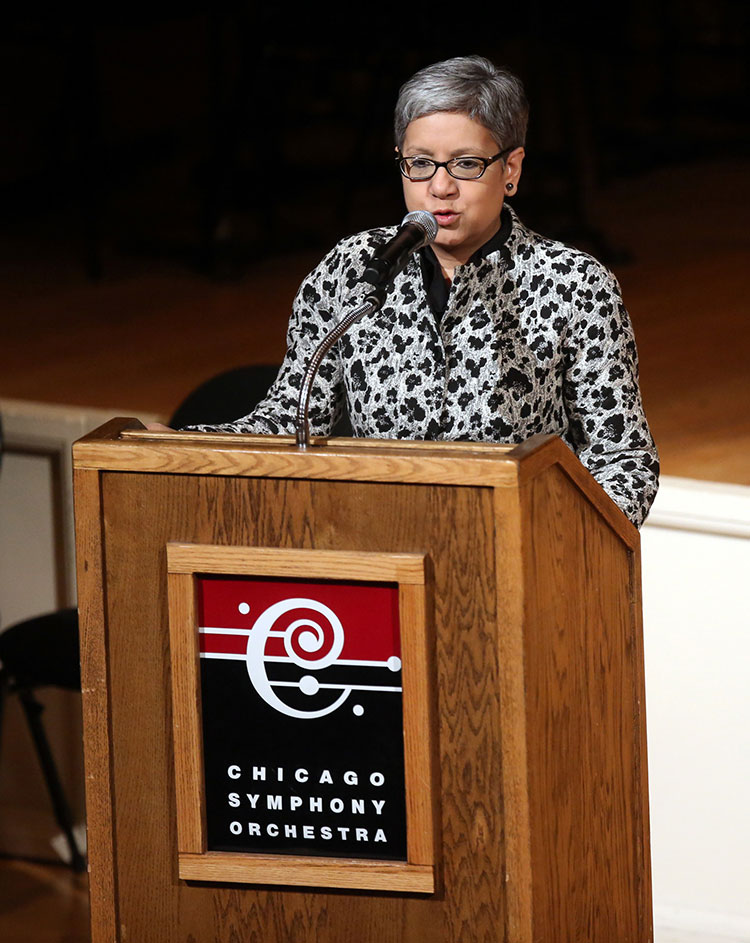Six years after renowned film critic Roger Ebert’s death, his full-time editor Laura Emerick remembers him for his humor, charisma and dedication.
Emerick, BA’79, edited Ebert’s work for nearly 30 years at the Chicago Sun-Times. Her stories of those years are plentiful.
“I remember working with him on Oscar night,” she said. “I can remember more than one occasion when we’re down to the wire and Roger is calling from California.”
She recalled that the Sun-Times had older presses that required earlier deadlines – something that didn’t always go over well with Ebert. She once urged him to send in his Oscar content as quickly as possible, to which he sassily replied, “Your deadlines mean nothing to me.”
Emerick said moments like this demonstrated his dedication to reviewing film. Quality, she recalled, was important to him.
“He really felt it was his duty to express his opinions,” she said. “It’s funny, because it always managed to get done somehow. He was a character, to say the least.”
Emerick began editing Ebert around 1985, but her career at the Sun-Times began in 1979.
“Journalism became my defector career,” she said. “But I’m glad it happened that way. I really have been so fortunate to work for a place like the Sun-Times.”
At IU, Emerick double majored in journalism and geography. Encouraged by the experience of editing her middle and high school papers, she knew she enjoyed writing as a discipline.
At the School of Journalism, she took courses in copywriting, editing, photojournalism and communications law under professors such as Trevor Brown, who later became dean.
“I remember all of my instructors, and I give thanks continuously for what they were able to instill in me and my fellow classmates,” she said.
Emerick also worked for the Indiana Daily Student in positions including features reporter, features editor, copy edit chief, opinion writer and opinion editor.
Emerick, who grew up near Fort Wayne and was born in Chicago, said she wanted to stay close to home, so when an IU professor approached her about an editorial internship at the Sun-Times, she applied.
Instead of an internship, the Sun-Times offered Emerick a full-time copy editing position. She skipped her graduation to begin work.
She recalls that the Sun-Times had recently converted to computers and that the employees at the almost exclusively male copy desk smoked frequently, which gave her headaches.
“It’s like you’re being dropped into a completely different world,” she said. “I was working with all these hardcore veterans and here I am, just this little kid from Bloomington, Indiana.”
Over the years, Emerick worked on various sections of the Sun-Times, including travel, food and fashion, before moving to weekend entertainment around 1985.
“And that’s where I started to work with Roger,” she said.
Ebert was the first film critic to win a Pulitzer Prize in Criticism, but that was in 1975, before Emerick’s time. She began to edit his work around 1985, and in 1994, editing his work became her full-time job.
“He was one of the fastest writers I’ve ever seen in my life,” she recalled. “He really felt it was his responsibility to review everything that was released.”
Sometimes that meant reviewing six to 10 films a week. Emerick said it wasn’t unusual for Ebert to attend a film screening on a Wednesday night and turn out a review by 9:30 p.m.
Emerick said Ebert’s critiques were about more than just films. They delved into how those films interacted with, reflected on and changed society.
“He was such a man of integrity,” she said. “That might seem like ‘Oh, everyone has that.’ But no, not really.”
During the years she edited Ebert, Emerick said she was offered opportunities at the Chicago Tribune, The New York Times and The Washington Post, but it was important to her to maintain her position at the Sun-Times, in large part of the opportunity it gave her to work with Ebert.
“I thought to myself, ‘The job I have here is going to be ultimately more meaningful to me,’” she said.
When Ebert died in 2013, Emerick left the Sun-Times after 34 years. It was time for something new.
Today, Emerick is digital content editor for the Chicago Symphony Orchestra, where she has worked since 2013. In many ways, Emerick said, working on the CSO magazine mirrors what she did as arts editor at the Sun-Times. She manages the symphony’s online magazine and oversees promotional video production.
When Emerick isn’t working at the CSO, she continues to write about film for the Sun-Times, the Alliance of Women Film Journalists and RogerEbert.com.
“I can do a certain amount of writing here for the magazine, but most everything is focusing on classical music and I have, still, a deep abiding interest in film,” she said.
This year, she’ll travel to El Paso, Texas, to attend the Plaza Classic Film Festival. She goes each year to conduct interviews, present films and write about the event.
“My dream is someday to retire and I can just go around the world and attend various film festivals,” she said.
As a member of The Media School’s Dean’s Advisory Board, Emerick returns to Bloomington at least twice a year to attend meetings. She said they frequently discuss ways to get alumni more involved and how alumni can help further the mission of the school in educating young media professionals.
Emerick said she hopes IU’s burgeoning journalists will be able to find where their journalism degrees intersect with their other interests.
“You would think that a place like this would have no use for people with journalism degrees,” she said of the CSO. “But it’s really a natural fit.”


